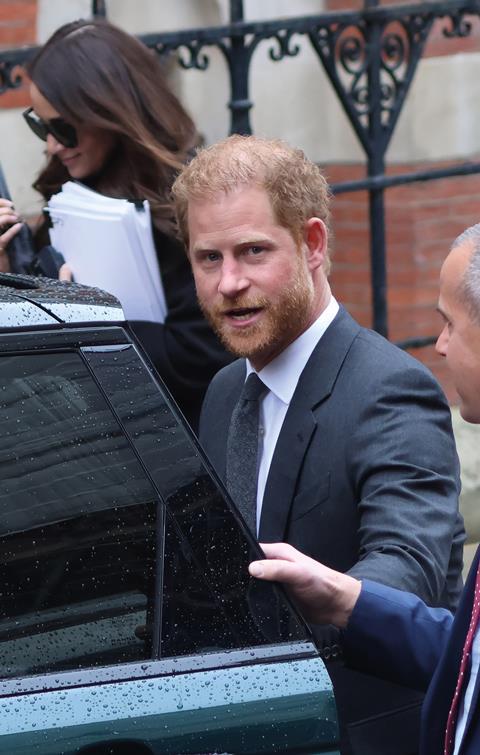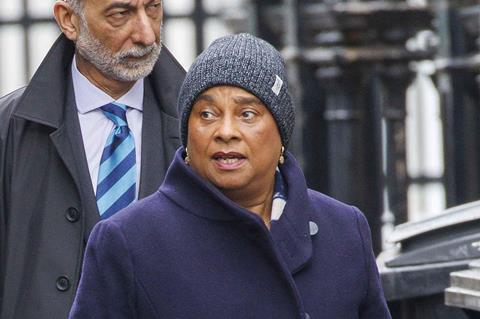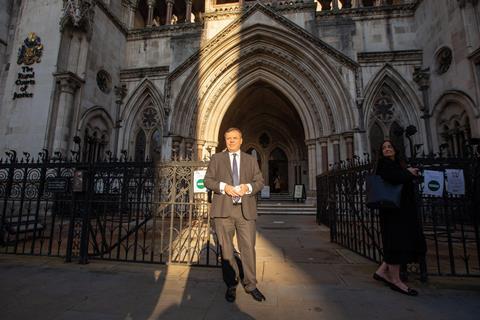From hacking claims to SLAPPs, the media – and media lawyers – remain under critical scrutiny. Catherine Baksi reports
The low down
Libel lawyers are in the spotlight over the use of oppressive litigation on behalf of wealthy clients to silence critics. Potential problems have also been thrown up by the latest technological breakthrough – chatbots that use artificial intelligence but which can make up ‘hallucinations’ that may be defamatory. Prince Harry is also keeping several of London’s law firms busy, suing three big media groups over allegations of phone hacking. More than a decade after the closure of the News of the World and the Leveson Inquiry, fundamental questions remain about the effectiveness of press regulation and what needs to change.
Prince Harry is expected to give evidence next month in a trial involving Mirror Group Newspapers, publisher of the Daily Mirror and Sunday Mirror, over alleged historical phone hacking. He alleges that his family and friends – from his father to the late television presenter Caroline Flack – were illegally targeted by Mirror journalists seeking stories between 1996 and 2010.
The prince is one of a number of celebrity claimants in the case, which began in the High Court days after the coronation of his father. Others include former Coronation Street stars Michael Le Vell and Nikki Sanderson, ex-footballer and TV presenter Ian Wright and the estate of the late singer George Michael.

Mirror Group denies the allegations in the first of Prince Harry’s three phone-hacking cases against British newspaper groups to go to trial.
The prince, who has said it his ‘life’s work’ to change Britain’s ‘media landscape’, has ongoing phone-hacking and breach of privacy claims against two other media groups – News Group Newspapers, publisher of the Sun, and Associated Newspapers, publisher of the Daily Mail.
The cases come more than a decade after the 2012 report by Lord Justice Leveson into the culture, practices and ethics of the British press. That probe came in the wake of the News International phone-hacking scandal and the closure of the 168-year-old News of the World.
Since the widespread allegations of impropriety in news-gathering by the British media came to light, following the revelation that the mobile phone of the murdered schoolgirl Milly Dowler had been hacked, the number of people affected is unknown. Hacked Off, the campaign group set up in response to the scandal, estimates that there may have been as many as 12,800 victims.
Investigative journalist Florence Wildblood suggests that at least 1,845 claims involving unlawful information-gathering by tabloid newspapers have been settled out of court since 2009.
A 2021 Press Gazette article – 10 years after the closure of the News of the World – estimated the payouts and legal costs incurred by Rupert Murdoch’s publishing empire at more than £1bn. Reach – which owns the Mirror titles – had by then paid out over £100m.
Media lawyer Jonathan Coad, whose celebrity clients have included Caroline Flack as well as Victoria and David Beckham, says that in the three cases being pursued by the Duke of Sussex, the papers think they may have a viable limitation defence. The claimants, he adds, are ‘commendably not in it to secure damages but to hold the press to account in a way which the politicians lack the guts to do’.
Hugh Tomlinson KC, barrister at Matrix chambers and chairman of the board of Hacked Off, says: ‘The latest cases against the Mirror newspapers have not settled because Prince Harry wants the truth to come out. And the Mirror newspapers also want a trial to determine which cases are out of time and whether the board and the lawyers knew what was going on.’
'This absence of accountability has undermined the public’s trust in the media, thereby undermining the important role they fulfil in our democracy'
Helena Shipman, Carter-Ruck
The prevailing view is that the behaviour of the tabloid media has improved since the Leveson Inquiry, with the use of phone-hacking and other illegal information-gathering practices ended. Part two of the inquiry was intended to investigate the relationship between journalists and the police, and incidences of criminality, but it never took place.
The government’s failure to follow through with Leveson, says Helena Shipman, a solicitor at claimant law firm Carter-Ruck, ‘left many unanswered questions regarding precisely who at the news organisations was responsible for the unlawful activity, questions which continue to be litigated to this day.
‘This absence of accountability has undermined the public’s trust in the media, thereby undermining the important role they fulfil in our democracy.’
While he acknowledges that the inquiry improved standards, Duncan Lamont, a consultant at Charles Russell Speechlys, argues that it ‘cost a vast amount of money and time, but didn’t achieve what we hoped’.
The ‘tragedy of Leveson’, he alleges, was that many witnesses for the newspapers lied, which meant that the scale of malpractice did not come out.
For Tomlinson, the inquiry represents ‘unfinished business’. Its main legacy was the press regulator, the Independent Press Standards Organisation (IPSO). ‘What in effect happened is that the press reconstituted the Press Complaints Commission under a new name,’ he says. Tomlinson insists that it is ‘the same legal entity as the PCC, with slightly changed rules. It’s not a regulator at all. It’s a complaints-handler – a fairly ineffective one at that’.
IPSO has the power to conduct standards investigations and levy fines but it has never done so. Several newspapers, including the Financial Times, Guardian and Independent, declined to take part in it.
‘The proposition that newspapers, such as the Sun and Mirror titles, whose historic abuse is finally emerging, should regulate themselves is risible,’ says Coad.
He would prefer to see the Editor’s Code administered by Ofcom – the body that regulates broadcast media – and the press to be ‘subject to proper regulation via a Leveson-compliant regulator such as Impress [the Independent Monitor for the Press]’.
Even those that want a Leveson 2 inquiry to take place accept that a combination of the power of the press and lack of appetite in government means it is unlikely to happen.
The government did, however – in the shape of former lord chancellor Dominic Raab – commit to act to stamp out the practice of bringing litigation that is designed to silence criticism. Most recently, Raab’s successor Alex Chalk KC has himself promised a new statutory definition, an early dismissal process for unwarranted claims and protection against excessive legal costs.
The prince and the papers
The Duke and Duchess of Sussex have kept lawyers busy over recent years, filing at least seven claims against UK and US media outlets since 2019. Prince Harry currently has four cases on the go against three of the biggest media groups.
Three relate to allegations of historical phone hacking and breach of privacy.
The Mirror Group Newspapers (MGN) trial is expected to last up to seven weeks. While Harry is expected to give evidence, Piers Morgan, Daily Mirror editor during part of the period to which the claims relate, will not give evidence.
In his second claim, Prince Harry is one of a group of high-profile figures alleging unlawful information-gathering at Associated Newspapers Limited (ANL). The publisher denies the allegations, which include phone-tapping and bugging people’s homes. The lawsuit also involves Sir Elton John and his husband David Furnish, Elizabeth Hurley, Sadie Frost and Baroness Lawrence (pictured).

Harry has a second, ongoing libel case against ANL over an article about his security arrangements in the Mail on Sunday. The paper says the article was based on ‘honest opinion’. He is pursuing the Home Office over the same protection issues.
He is also suing News Group Newspapers (NGN) for alleged phone-hacking by the Sun.
The prince is spreading instructions among four law firms in the cases. In the phone-hacking claims, he has instructed Clintons in both the MGN case and the NGN case; and Hamlins in the group action against ANL.
In a fourth action, Schillings is pursuing a libel claim against ANL over the article about his security arrangements.
In all the privacy cases the prince is represented by the barrister David Sherborne of 5RB, while his chambers colleague Justin Rushbrooke KC is acting in the libel claim.
As public scrutiny of allegedly abusive litigation intensified in the wake of Russia’s invasion of Ukraine, and amid evidence that strategic litigation against public participation (SLAPPs) was being used more frequently, Raab proposed the introduction of US-style anti-SLAPPs legislation. This would involve a three-stage test to allow judges to dismiss early in proceedings cases that lacked merit.
He proposed a change to the law that would mean that for public figures to succeed in a libel action, they would have to show that the defendant had acted maliciously.
In a warning note published last November, the Solicitors Regulation Authority told law firms: ‘Proceedings must be pursued properly… representing your client’s interests does not override wider public interest obligations and duties to the courts.’
In February, SRA chief executive Paul Philip said the organisation was investigating 40 complaints about law firms’ alleged use of SLAPPs over the previous 12 months. An SRA spokesman confirmed to the Gazette that this figure has since risen to 50, but was not able to divulge the outcome of any investigation.
Bob Seely, the Conservative MP for the Isle of Wight, had previously introduced proposals through a private member’s bill that would create the ability to fine law firms up to £1m for using SLAPPs. Speaking in parliament, he accused law firms that used such tactics of ‘legal gangsterism’, naming several. All the firms named have repeatedly denied any wrongdoing.
Among lawyers there is debate over the prevalence of SLAPPs, with several on the claimant side suggesting that the criticism of lawyers is unfair and that the government is over-reacting by seeking to legislate.
Critics point to the SRA’s thematic review of 25 firms which practise in reputation management. In a spot check, selecting two files from a list that was given to them of all matters that had been closed in the preceding 18 months, the review ‘did not find evidence of SLAPPs’.
Justin Rushbrooke KC, joint head of chambers at specialist media set 5RB, told the justice committee last year that ‘a SLAPP case, properly understood, is something of a chimera in this jurisdiction’.
Gideon Benaim, a partner at Simkins, agrees, telling the Gazette that the issue of SLAPPs ‘isn’t as widespread as has been portrayed’. He accepts that it is ‘clearly important to deter and prevent abusive behaviour’, but argues that from the perspective of most claimant lawyers, the court already has sufficient powers to deal with abuses.
‘Any legislative, regulatory or court procedure changes ought to very carefully ensure that legitimate complainants are not adversely impacted,’ warns Benaim. The failure by the government to define a SLAPP, he suggests, creates the danger that actions might routinely – perhaps carelessly – be described as being a SLAPP, when they are not. He cites Banks v Cadwalladr.

In 40 years of practice, Tomlinson says that he has never seen a SLAPP. He accepts that they exist, but says that a SLAPP, which he defines as a case where ‘there is no proper basis for bringing it and that is just an abuse,’ is very rare.
Pointing to Canada, which has introduced anti-SLAPP laws, he cautions against introducing legislation that has the unintended consequence of increasing the length and cost of libel litigation.
Shipman, another claimant lawyer, stresses that ‘there is no place in our justice system for abusive conduct in litigation,’ and claims that the media team at Carter-Ruck has not encountered any SLAPP cases.
Claimant lawyers, she insists, are at pains to avoid the perception of facilitating SLAPP-type behaviour, which can lead to the creation of obstacles to access to justice and legal representation. Shipman observes: ‘Both claimant and defendant media lawyers play an important role in upholding the rule of law, and by over-politicising and personalising the SLAPP debate we run the risk of undermining the very fabric of our justice system.’
'Even the most ardent claimant lawyers would accept that it’s possible to abuse our libel laws to stop legit journalism'
Rupert Cowper-Coles, RPC
On the defendant side, RPC partner Rupert Cowper-Coles says there is a sense from claimant lawyers that SLAPPs have created a something of a witch-hunt – a concern voiced by some barristers, who he says regard the cab rank rule as sacrosanct and insist they have a duty to take whatever case comes along.
But he suggests that ‘even the most ardent claimant lawyers would accept that it’s possible to abuse our libel laws to stop legit journalism’. In favour of action, Cowper-Coles says that ‘for decades there has been no consequence for those who effectively turn a blind eye’ to the motive or truth of what claimants tell them, and display a willingness to threaten investigative journalists.
Heightened discussion over legal tactics, he suggests, is already having a big deterrent effect, though he laments the slow progress: ‘If the EU, US, Canada and Australia have found the legal mechanism for discouraging SLAPPs and we are widely regarded as one of the worst-offending jurisdictions, because of our costs regime and claimant-friendly libel rules, if we don’t do something we are going to be an outlier jurisdiction.’
Overall, the number of new claims issued in the Media and Communications List of the King’s Bench Division has fallen in recent years. Figures from HM Courts & Tribunals Service’s e-filing service show a total of 202 new claims were issued in 2022, a 64% fall on 564 in 2021.
The fall, explains Shipman, is largely attributed to the drop in data protection claims, as a result of the High Court decision in Warren v DSG Retail [2021] EWHC 2168 (QB). This meant that such cases could no longer be brought as misuse of private information claims, with the result that ATE premiums were no longer recoverable.
Second, the Supreme Court decision in Lloyd v Google [2021] UKSC 50 meant the end of data protection representative actions.
The data, she adds, also shows a shift in the types of claim. Fewer claims are issued against major news publishers and more are issued between private parties, often following disputes on social media.
In a recent landmark case, a woman successfully defended a £70,000 libel claim from a man she accused of sexually assaulting her, after the police had taken no action. The High Court ruled that the allegations in online posts and emails made by Nina Cresswell against Billy Hay were ‘substantially true on the balance of probabilities’.
Mrs Justice Heather Williams also ruled that Cresswell’s publications were ‘on a matter of public interest’, that Cresswell believed that it was in the public interest to publish them and that her belief was reasonable in all of the circumstances.
Lawyers suggest that it sets an important precedent in relation to the discussion of experiences of sexual violence online.
ChatGPT and other generative artificial intelligence computer programs are likely to create work for libel lawyers. Their propensity to produce falsehoods – known as ‘hallucinations’– presents a risk of defamation that the courts will need to grapple with quickly to prevent the risk of unaccountability, says Wiggin partner Matthew Dando. The question of who is the publisher, he says, is simple to state but hard to answer.
Liability for defamation, suggests Benain, could be laid at the door of a number of entities, including the source of the information that the AI was taught from, if it contained defamatory statements, or the company that controls the service.
Users of an AI service who repeat the defamatory statement it produced can also be held liable for its repetition. Concluding on a positive note, with new issues thrown up by technology and social media, the English courts, says Tomlinson, have been good at adapting.

Catherine Baksi is a freelance journalist































No comments yet